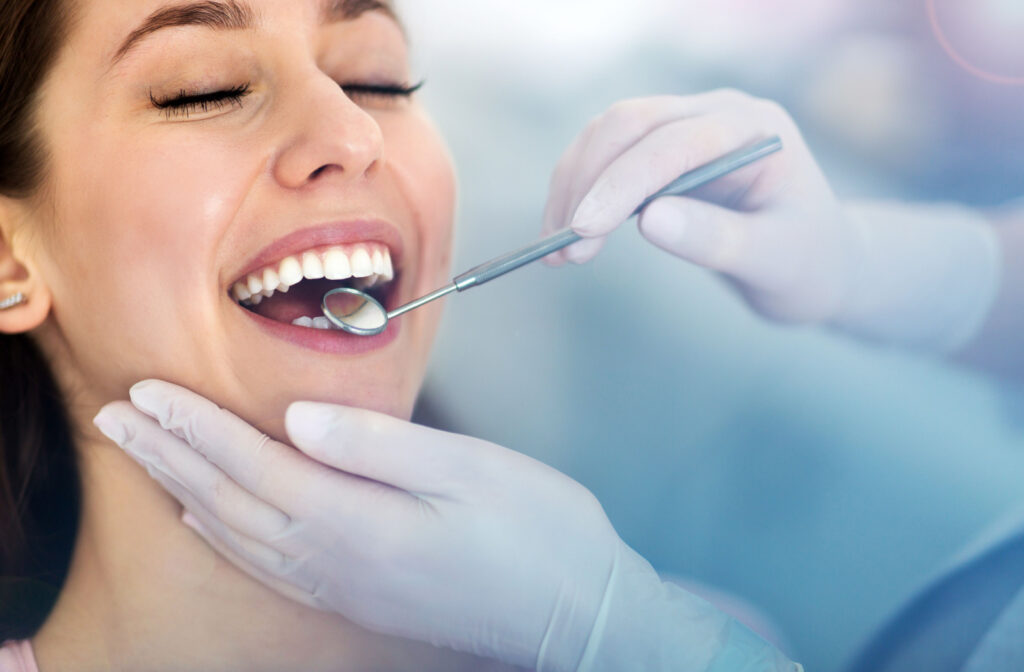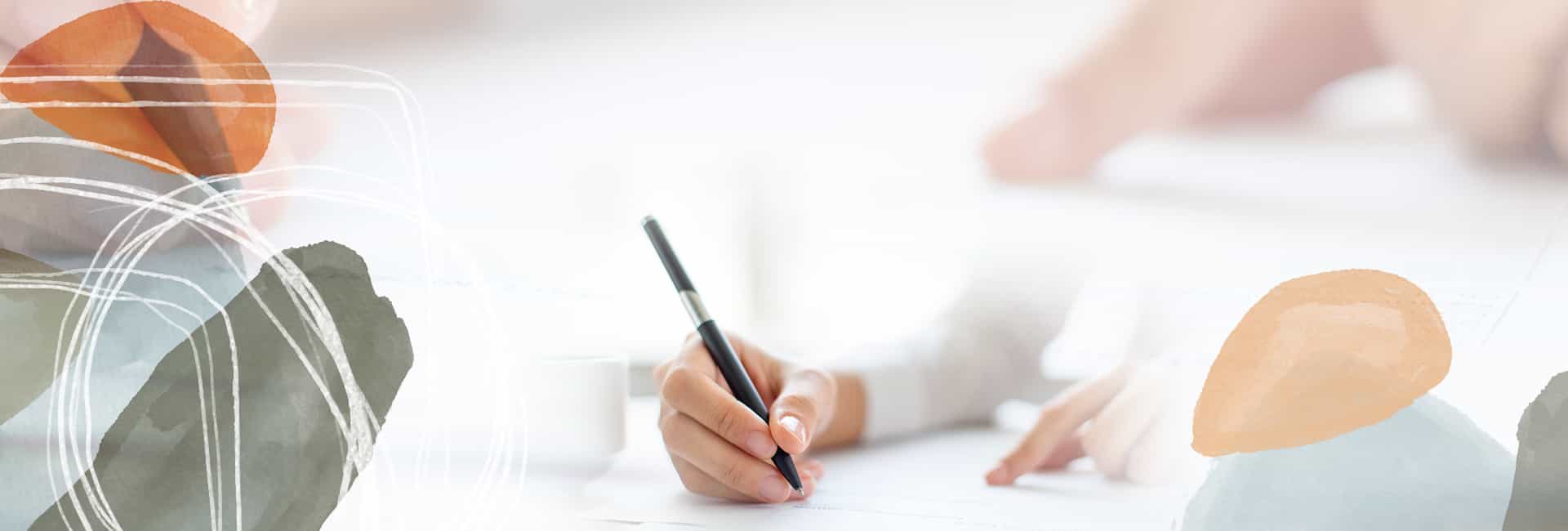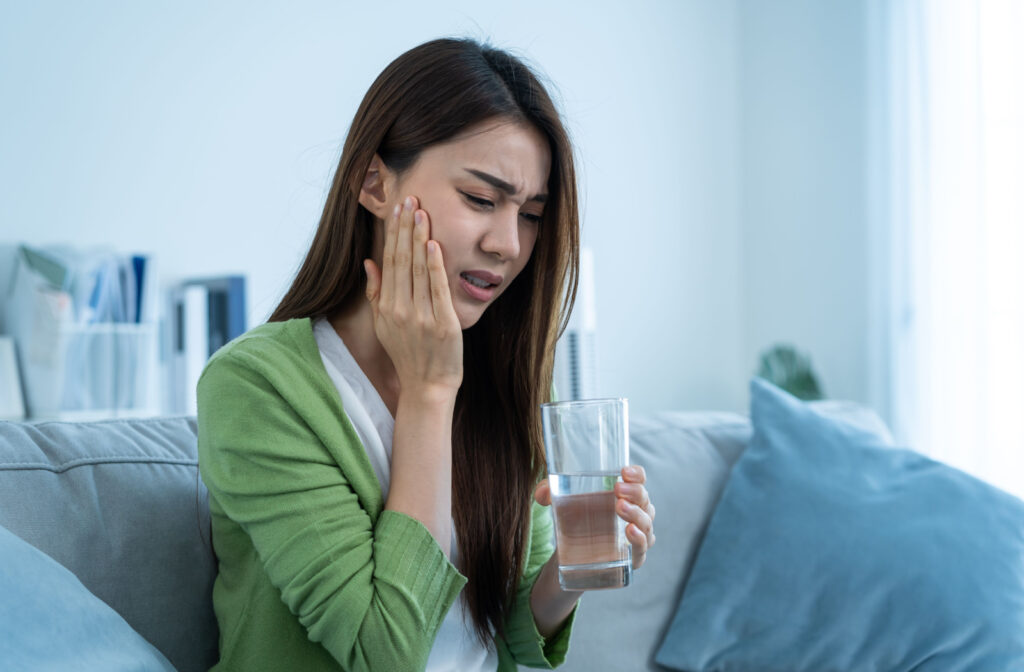A dental exam typically includes a checkup for dental issues like cavities and may include a recommendation for a filling. Dental fillings are a common treatment for cavities that can help restore the function of damaged teeth.
While many people experience positive outcomes from dental filling procedures, some may experience tooth sensitivity after a filling as well. Tooth sensitivity can be an immediate or delayed response to a filling. The causes of tooth sensitivity after a filling can include nerve irritation, inflammation, an allergic reaction, or a misaligned bite.
What Are Dental Fillings?
A dental filling is a restorative dental procedure designed to repair and preserve a tooth that has suffered damage from decay or trauma. The process involves removing the decayed or damaged part of your tooth and filling the resulting cavity with a suitable material. For small cavities, fillings are a straightforward procedure. However, if the cavity is large, the tooth may need to be removed, and a dental implant may be recommended to replace it.
A dentist may use various filling materials based on factors like the location of your damaged tooth, the extent of the damage, and individual preferences.
The purpose of a filling is not only to restore your tooth’s structural integrity but also to prevent further decay, promote oral health, and help maintain the functionality and aesthetics of your natural tooth.
Anxiety around filling procedures is common in children and adults, but laser dentistry technology helps us complete fillings without the needles and drills that can cause anxiety and discomfort. If you or your child needs a dental filling, it may be worth considering the benefits of laser dentistry.
Tooth Sensitivity after a Filling
During a dental filling procedure, your dentist will numb the area of your mouth near your tooth before cleaning the decayed area and filling it with new material. When the numbing wears off, you may feel some tooth sensitivity that typically subsides over time.
Sensitivity after a tooth filling can be temporary but could be made worse by the following triggers:
- Cold foods or drinks
- Hot drinks
- Air hitting your tooth while you breathe
- Sugary foods
- Acidic foods and drinks
- Biting down with your sensitive tooth
Causes of Persistent Tooth Sensitivity after a Filling
Persistent or severe tooth sensitivity after a filling can indicate other issues. It’s important to visit your dentist to determine the underlying cause.
Some of the common causes of persistent tooth sensitivity after a filling include nerve irritation, dental pulp inflammation, an allergic reaction to filling materials, and a misaligned bite.
Dental Nerve Irritation
Especially with larger or deeper cavities, a filling procedure can occur close to the nerve endings in your tooth. While this irritation is usually temporary and goes away as the nerve heals, it can cause tooth sensitivity, especially when your teeth are exposed to hot, cold, or sweet stimuli.
Dental Pulp Inflammation
In some cases, your dental pulp—the innermost part of your tooth containing nerves and blood vessels—may become inflamed during a filling procedure, leading to pulpitis. Pulpitis can lead to heightened tooth sensitivity and pain.
In reversible pulpitis or mild inflammation, your tooth may heal independently. In irreversible pulpitis, the damaged nerve may start to die, and the only way to save the affected tooth may be to do a root canal.
Allergic Reaction
Sensitivity after a dental filling could be from an allergic reaction to the materials used during the filling procedure. If you notice a rash or experience itching occurring alongside persistent tooth sensitivity after a filling, you should contact your dentist.
Misaligned Bite
Sometimes, tooth sensitivity after a filling can occur for a few days from biting down on the filling. If a filling alters how your teeth align, it can create pressure and additional stress as you bite down on the tooth.
Symptoms of a misaligned bite can include pain, discomfort, and sensitivity. For severe sensitivity or difficulty eating due to bite alignment, you should visit your dentist to check your bite and adjust the filling as needed.
Preventing & Treating Tooth Sensitivity
While the causes of tooth sensitivity after a filling may be temporary, there are things you can do to prevent and treat tooth sensitivity, including the following:
- Avoid extreme temperatures: While your teeth are recovering, you should avoid foods and beverages with extreme temperatures. Opt for lukewarm or room-temperature items to minimize discomfort.
- Maintain your oral hygiene: Maintaining excellent oral hygiene is crucial for preventing further sensitivity and keeping dental issues at bay. Brush with gentle, circular strokes on your teeth and gums.
- Avoid whitening toothpaste and products, which can make sensitivity worse.
- Rinse your mouth with water after eating acidic foods or drinks.
- Avoid brushing your teeth immediately after eating acidic foods.
In some cases, medication may be recommended for treating intense pain from tooth sensitivity. It’s important to speak with your doctor if you experience severe pain to determine how you can safely manage your symptoms.

Dental Visits for Healthy Teeth & Gums
Tooth sensitivity after a filling can be common and tends to resolve within a few days on its own. But if your sensitivity persists or worsens, you can book an appointment with Palermo Village Dental to identify the underlying issue and get help with alleviating your discomfort.
You can prevent sensitivity by practicing good oral hygiene, using a desensitizing toothpaste, cutting down on acidic and sugary foods, and visiting your dentist for routine checkups.




